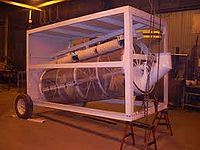Difference between revisions of "Rotary Screeners"
Jump to navigation
Jump to search
(Created page with "Category:Separating{{Knoppen}} <noinclude><!------------------------------------------------ * READ THIS FIRST * Only edit this page if you can improve the content. * Improp...") |
|||
| Line 7: | Line 7: | ||
* Please start editing this page after the /noinclude | * Please start editing this page after the /noinclude | ||
* -------------------------------------------------></noinclude> | * -------------------------------------------------></noinclude> | ||
[[File:Rotary screeners_1.jpg|thumb|200px|right|Rotary screeners]] | |||
'''Rotary screeners''' are best suited for scalping, in other words small amounts of oversize product. In addition, the rotary screen provides large output capacities for its floor area and price tag. It also offers a great deal of benefit to users who are concerned about screen blinding. | |||
==Principles of Operation== | |||
The rotating bars move material through the stationary screen cloth section along the machines axis dispensing the rejected product from a chute at the end of the screen. Product de-lumping might be experienced so recommends that warm or soft pellets and other similar materials be processed on one of our other screens instead of the rotary separator. | |||
==Typical Features== | |||
*Efficient Processing | |||
*Food Grade Construction | |||
*Low impact Vibration | |||
*Dependable, Performance | |||
*Low Maintenance | |||
*Extremely Versatile | |||
==Applications== | |||
*Corn and Grain | |||
*Sugar | |||
*Spices | |||
*Blend Ingredients | |||
*Industrial Powders | |||
*Food Additives | |||
==Video== | |||
<youtube>Ai3uNKK504o</youtube> | |||
Latest revision as of 04:50, 26 April 2013
Rotary screeners are best suited for scalping, in other words small amounts of oversize product. In addition, the rotary screen provides large output capacities for its floor area and price tag. It also offers a great deal of benefit to users who are concerned about screen blinding.
Principles of Operation
The rotating bars move material through the stationary screen cloth section along the machines axis dispensing the rejected product from a chute at the end of the screen. Product de-lumping might be experienced so recommends that warm or soft pellets and other similar materials be processed on one of our other screens instead of the rotary separator.
Typical Features
- Efficient Processing
- Food Grade Construction
- Low impact Vibration
- Dependable, Performance
- Low Maintenance
- Extremely Versatile
Applications
- Corn and Grain
- Sugar
- Spices
- Blend Ingredients
- Industrial Powders
- Food Additives
Video
